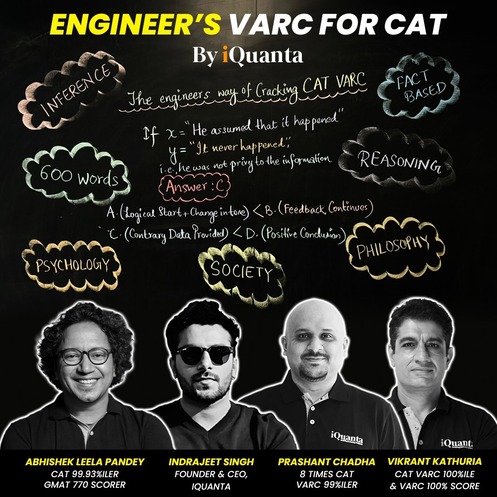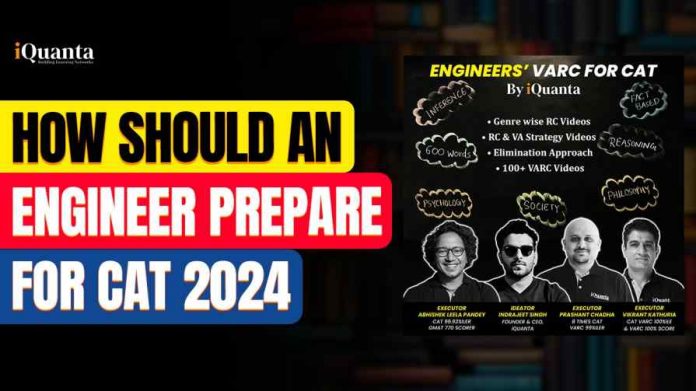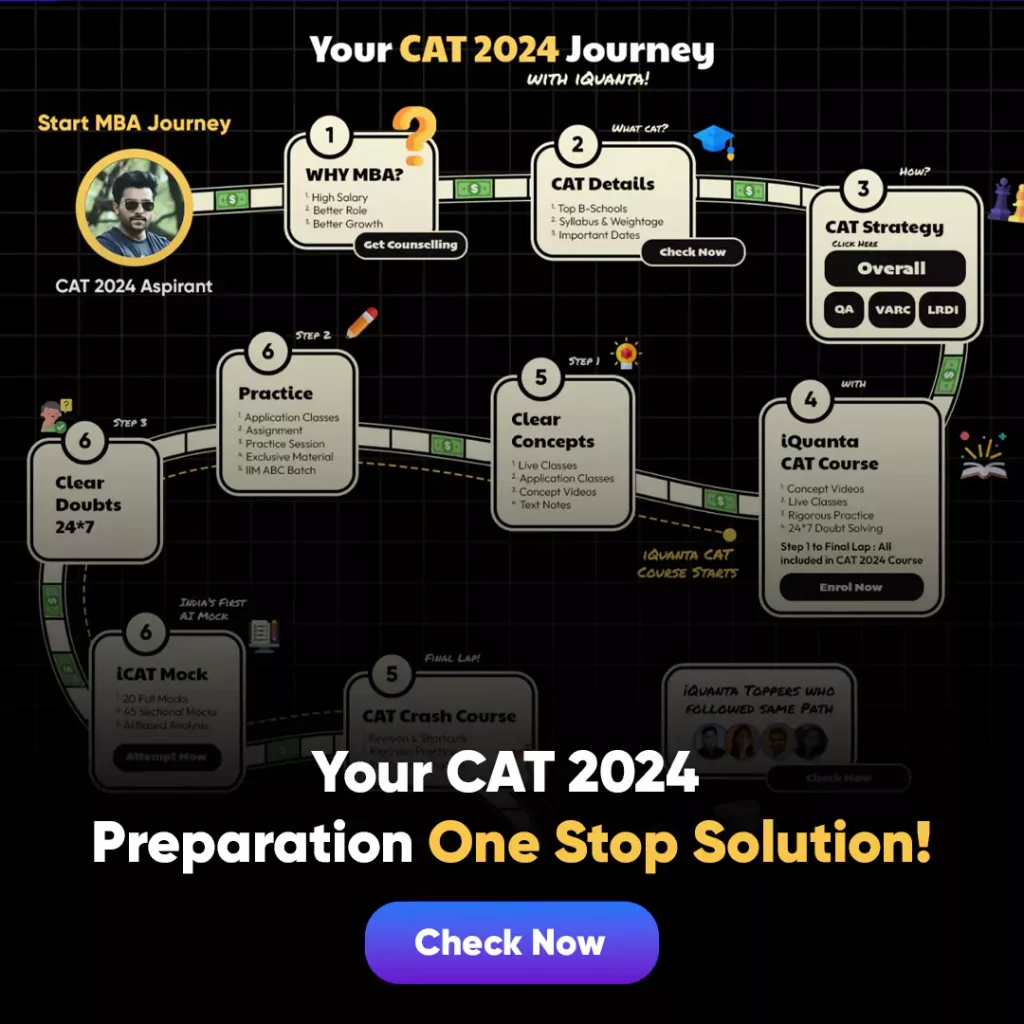When One hears the term ‘Engineer’ with ‘CAT Exam’, they are forced to make the usual assumption that Engineers are good with maths. This might not be true for all, but still given the engineering curriculum, engineers are somewhat habitual when it comes to numbers and building logic to solve a problem. Hence it is often observed that CAT aspirants from engineering backgrounds keep their CAT Preparation Quants heavy, which again can be a good and bad thing at the same time. Another fact that has been observed among engineering candidates, is that they mostly aren’t habitual in reading, and that is the reason they end up facing certain problems in CAT’s VARC Section. In this article, we aim to deliver a foolproof preparation strategy, that an Engineer should follow to ace CAT 2024.
Enroll for iQuanta CAT Coaching

Key Preparation Strategies for Engineers:
1) Keep a Balanced Approach.
As an engineer, one is expected to be well-versed in basic numerical concepts, calculations, and problem-solving. However, it is observed that engineers often tend to focus more on the Quantitative Aptitude Section, as it is already their forte, meanwhile, they tend to ignore the Verbal section, as it requires reading which bores the logical brains of engineers. Hence when it comes to the CAT exam, it’s crucial to find the right balance between your quantitative strengths and the equally important verbal section, as both sections are equally important for the exam. Hence engineers should avoid the trap of solely focusing on the Quant Section.
2) Focus on strengthening your weak Areas: Develop a Reading Habit
One of the key strategies for engineers preparing for the CAT is to prioritize building a strong reading muscle. From the initial stage, dedicate a significant portion of your time to reading extensively across various genres, styles, and perspectives. This will not only improve your comprehension skills but also enhance your overall verbal abilities, which can be a game-changer for the CAT’s VARC Section.
Immerse yourself in a diverse range of materials, from novels and non-fiction to articles and essays. Broaden your horizons and challenge yourself to read beyond your comfort zone. Engage with Bharat’s reading list and explore the wealth of knowledge it has to offer. Remember, the more you read, the more equipped you’ll be to tackle the verbal section of the CAT.
3) Start with Brushing up your Basics:
As an engineer, you may be tempted to dive straight into the more complex mathematical concepts, such as algebra, trigonometry, and geometry. However, this approach may not be the most effective for the CAT exam. Instead, focus on mastering the fundamental topics in the quant section, such as percentages, profit and loss, simple interest, and compound interest.
Resist the urge to chase the tougher questions, as the scoring is the same for all questions. Instead, aim to build speed and accuracy on the simpler topics. This will not only boost your confidence but also ensure that your quantitative advantage is fully leveraged in the exam.
4) Adjust the Engineer’s Mindset
As an engineer, you may have developed a certain mindset and approach to problem-solving. While these skills are valuable, they may not always translate directly to the CAT exam. It’s important to bend your strategies according to the nature of the exam.
Avoid getting caught up in the temptation to showcase your mathematical prowess by tackling complex questions. Instead, focus on building a well-rounded skillset that combines your quantitative strengths with a strong verbal foundation. This balanced approach will serve you better in the long run and increase your chances of scoring well in the CAT exam.
5) Be Ready for the Unexpected
The CAT exam is designed to challenge candidates from diverse backgrounds, including engineers. While your technical expertise may be an advantage in certain areas, the exam will also test your ability to think critically, communicate effectively, and adapt to unexpected situations.
Approach the CAT with an open mind and a willingness to explore new strategies and techniques. Be prepared to step out of your comfort zone and embrace the challenges that the exam presents. By doing so, you’ll not only improve your performance but also develop valuable skills that will serve you well in your future endeavours.
Conclusion
As an engineer preparing for the CAT exam, it’s essential to strike a balance between your quantitative strengths and the equally important verbal section. By prioritizing reading and mastering the fundamentals, you can unlock your full potential and increase your chances of success in the exam.
Remember, the CAT is a unique challenge that requires a multi-faceted approach. Embrace the opportunity to grow, adapt, and showcase your versatility as a candidate. With dedication, strategic planning, and a willingness to step out of your comfort zone, you can conquer the CAT and pave the way for your future success.
What is Engineer’s VARC And how does it help?

iQuanta Engineer’s VARC is the ultimate solution for students who are weak in English to prepare for VARC. Module Includes Genre-wise RC videos and Detailed VA videos with solutions. This module has been added to the CAT 2024 Course and its key focus is to develop comprehension abilities in students. It consists of videos on understanding tone, assumption & inferences.
The Engineer’s VARC Module consists of a total of 60+ Videos, with 30 hours of VARC Niche content. It consists of RC Videos, Verbal Ability Videos, and Strategy Videos.
Where to Prepare for CAT 2024?
If you are looking for structured CAT preparation along with 24*7 doubt-solving, you can rely on iQuanta’s CAT 2024 Course. Practice the most relevant CAT-level content with iQuanta.


